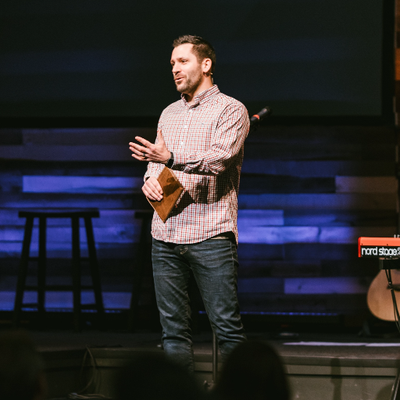
By Dustin Schadt
As a 21-year-old with two months of marriage under my belt, fresh enrollment in seminary, and no children of our own, I became a student pastor.
My pastor gave me a shot as a zealous young guy, and I’m forever grateful. I made a lot of mistakes, learned, and pressed forward for 10 years in student ministry.
In a new season of ministry, I’ve been a lead pastor for five years, and my wife April and I have three of our own kids in student ministry, and one more not far behind.
Looking back, I can think of five things that I would have done differently as a student pastor.
1. Let parents know more I’m praying for them, not just their students.
Parenting is tough, and knowing I have someone praying for me and my child would be tremendously encouraging.
Just the simple act of having someone who cares about my children looking me in the eye, with a hand on my shoulder, letting me know that they’re praying for us would mean the world.
One of the (many) jobs of a student pastor is to raise the perceived value of our church ministry in the eyes of parents. Few things do this faster than assurance of prayer for a family.
2. Place a greater emphasis on teaching sound doctrine in a way students can understand and remember and help parents do the same.
Most parents want to do the right thing, but often lack an on-ramp to do so.
As a young guy, I assumed parents didn’t read the emails we sent or booklets we sent home. Some won’t. But others will be deeply encouraged and equipped by helpful resources.
Eleven years from now our youngest child will (Lord willing) graduate from high school. I don’t know everything about the world he’ll be launched into. But I do know the unchanging Word of God, and the better our children can remember, understand, and articulate their faith, the more they’ll be equipped to face an ever-changing world.
3. Talk about the practical and tactical stuff more often.
Don’t shy away from topics like dating, gender issues, talking about your faith at school, living peacefully with parents/teachers/coaches are topics that press on students every day. I’d spend more time humbly equipping parents to do the same.
Students are getting pounded by a worldview that is not only non-Christian, but often anti-Christian. By speaking in a memorable way to the pressing topics in their lives, I gain credibility with students and their families.
At most, each student spends about three hours a week at church. That means we have to give them truth that will make an impact the other 165 hours of their weekly lives.
4. Spend more time helping students learn how to share their faith, get practice, and live on mission.
Young people should see their parents modeling a life on mission at home, and student gatherings, mission trips, and the school campus are excellent laboratories for learning and growth outside the home.
I’d spend a lot less time crafting an attractive student ministry environment, and more time training an army of young missionaries.
5. Never underestimate the power of another godly adult’s influence.
Recruiting, training, deploying, and coaching adult volunteers in student ministry is not an easy task. But it is a vital one.
A large portion of the health of your student ministry rises and falls on the health, maturity, and engagement of your team of adult leaders.
I would never underestimate the impact of another godly adult looking into the eyes of a young person and saying, “Jesus loves you. I care about you. And everything is going to be OK.”
If you could give advice to yourself as you started in ministry, what would you say?

Student Ministry by the Book: Biblical Foundations for Student Ministry
Ed Newton & R. Scott Pace
FIND OUT MORE







